| Phatnotis | |
|---|---|
| Scientific classification | |
| Domain: | Eukaryota |
| Kingdom: | Animalia |
| Phylum: | Arthropoda |
| Class: | Insecta |
| Order: | Lepidoptera |
| Family: | Lecithoceridae |
| Genus: | Phatnotis Meyrick, 1913 |
Phatnotis is a genus of moth in the family Lecithoceridae. [1]
| Phatnotis | |
|---|---|
| Scientific classification | |
| Domain: | Eukaryota |
| Kingdom: | Animalia |
| Phylum: | Arthropoda |
| Class: | Insecta |
| Order: | Lepidoptera |
| Family: | Lecithoceridae |
| Genus: | Phatnotis Meyrick, 1913 |
Phatnotis is a genus of moth in the family Lecithoceridae. [1]

Copromorphidae, the "tropical fruitworm moths", is a family of insects in the lepidopteran order. These moths have broad, rounded forewings, and well-camouflaged scale patterns. Unlike Carposinidae the mouthparts include "labial palps" with the second rather than third segment the longest. With other unusual structural characteristics of the caterpillar and adult, it could represent the sister lineage of all other extant members of this superfamily. The genus Sisyroxena from Madagascar is also notable for its unusual venation and wing scale sockets.

The Plutellidae are a family of moths commonly known as the diamondback moths, named after the diamondback moth of European origin. It was once considered to have three subfamilies: Plutellinae, Praydinae, and Scythropiinae. Praydinae was later elevated to its own family, Praydidae, while Scythropiinae has variously been moved to Yponomeutidae or also elevated to its own family.
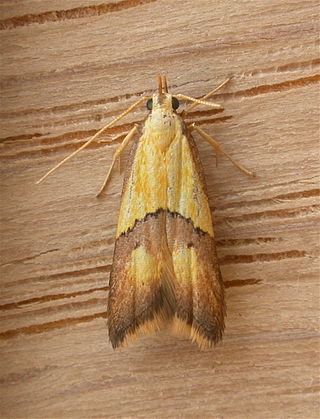
The Lecithoceridae, or long-horned moths, are a family of small moths described by Simon Le Marchand in 1947. Although lecithocerids are found throughout the world, the great majority are found in the Indomalayan realm and the southern part of the Palaearctic realm.

Anarsia is a genus of moths in the family Gelechiidae.

Brachmia is a genus of the twirler moth family (Gelechiidae). Among these, it is mostly placed in the subfamily Dichomeridinae.

Dichomeris is a genus of moths in the family Gelechiidae erected by Jacob Hübner in 1818.
Helcystogramma is a genus of moths in the family Gelechiidae. The genus was erected by Philipp Christoph Zeller in 1877.

Hypatima is a genus of the twirler moth family (Gelechiidae). Among these, it belongs to a distinct lineage, which is variously treated as tribe Chelariini in subfamilies Dichomeridinae, Gelechiinae, or even Pexicopiinae, and historically was considered a subfamily in its own right, Chelariinae. Of this lineage, Hypatima – under its junior synonym Chelaria – is the type genus. This genus has numerous species, but its exact limits are not quite clear. This genus occurs mainly in the Southern Hemisphere, though one of the better-known species is the only member of this genus native to Europe, the lobster-clawed moth.

Polyhymno is a genus of moths in the family Gelechiidae.
Schizovalva is a genus of moths in the family Gelechiidae.

Metasia is a genus of moths of the family Crambidae. They are found mainly in Europe and Australia, but also in Africa, Asia, North America, and Pacific islands.

Udea is a genus of snout moths in the subfamily Spilomelinae of the family Crambidae. The genus was erected by Achille Guenée in 1845. The currently known 216 species are present on all continents except Antarctica. About 41 species are native to Hawaii.

Platyptilia is a genus of moths in the family Pterophoridae. The genus was described by Jacob Hübner in 1825.
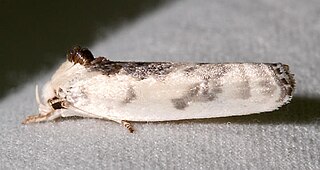
Antaeotricha is a genus of moths. It is the largest genus in the subfamily Stenomatinae, numbering over 400 species in the Western Hemisphere.
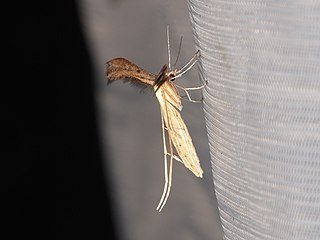
Pterophorinae is a subfamily of moths in the family Pterophoridae.
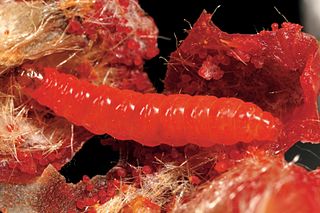
Carposina is a genus of moths in the Carposinidae family.
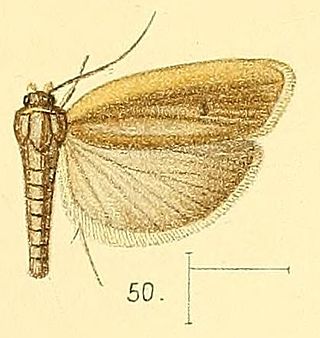
Stenoma is a genus of moths. The type species is Stenoma litura, which was described by Philipp Christoph Zeller in 1839.
Chlamydastis is a genus of moths in the subfamily Stenomatinae.
Phatnotis legata is a moth in the family Lecithoceridae. It was described by Edward Meyrick in 1913. It is found in southern India.
Heosphora is a genus of moths in the family Pyralidae. The genus was first described by Edward Meyrick in 1882. The type species is Anerastia psamathella Meyrick, 1879, designated as such by George Hampson in 1901. All Heosphora species are found in Australia.